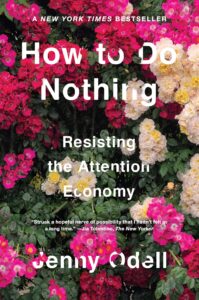‘Non-doing’ is an aspect of the way the Alexander Technique nurtures wellbeing: whether that’s mental, physical, emotional or spiritual. In FM Alexander’s own explanation of the term from the 1940s, non-doing involves withholding action in order to prevent the habitual reaction to a stimulus.

Fast forward several decades and Jenny Odell’s How to do nothing: resisting the attention economy (NY: Melville House) is a bestselling publication from 2019. It has a central preoccupation with ‘doing nothing’ in the face of modern technological and capitalist pressures, and as such intersects in an interesting way with the Alexander Technique.
Part manifesto, part memoire, part social science commentary, Odell’s book takes a long, hard look at the damage done to our (collective) selves by our interaction with technology companies. The ‘attention economy’ in her title refers to how these companies will do everything they can to capture, manipulate and monetize our attention, particularly in the online space. While these attention-grabbing attempts may at first seem simply ‘annoying’, many now recognize their potential long-term harm.
Those of us who spend time online, and in particular on social media, are in effect being primed on a daily basis for perpetual distraction, passivity and addiction for the purpose of someone else’s commercial gain. In the face of this onslaught, we should be genuinely concerned about how these stimuli interfere with our faculties of reflection, self-regulation, intentionality, autonomy and sense of self. Odell sums up the predicament of many people:
In a situation where every waking moment has become the time in which we make our living, and when we submit even our leisure for numerical evaluation via likes on Facebook and Instagram, constantly checking on its performance like one checks a stock, monitoring the ongoing development of our personal brand, time becomes an economic resource that we can no longer justify spending on ‘nothing’.
Jenny Odell, How to Do Nothing: Resisting the Attention Economy, p.15
‘Doing nothing’ in this context therefore becomes an act of resistance. Odell goes on to describe how she considers doing nothing both ‘as a kind of deprogramming device and as sustenance for those feeling too disassembled to act meaningfully’.
For her, this is a form of ‘self-care’: not in a self-indulgent or commercialized sense, but as an act of self-preservation. She reminds us that we can refuse to be productive or efficient, that leisure time does not have to be quantified or about ‘self-development’, and that time well spent can be about maintenance and care rather than ‘progress’. In other words – strange as it may seem to have to emphazise this – it is ok not to have anything to show for the time you’ve spent.
To pause, to stop, to say ‘no’ to a habit, or to do nothing – from the perspective of the Alexander Technique, all of these have intrinsic value. And it is fascinating to see similar themes re-emerging in a different context over a hundred years since Alexander developed his Technique.
In her writing, Odell looks to the restorative effects of re-engaging with nature, art, a sense of place (‘bioregionalism’), the humanity of others and – last but not least – a sense of our own embodiment. Anyone with an interest in Jenny Odell’s writing is sure to find in the Alexander Technique, and its principle of non-doing, a valuable approach for dealing with the increasingly overwhelming demands on our attention in today’s world. As FM Alexander himself wrote,
For in the mind of man lies the secret of his ability to resist, to conquer and finally to govern the circumstances of his life.
FM Alexander, Man’s Supreme Inheritance (first published 1910).

